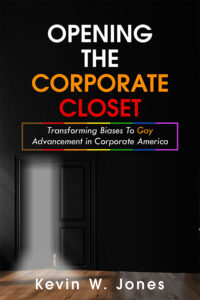
Opening the Corporate Closet means more than just being authentic at work; it’s about establishing a workplace culture that enables people to be themselves and succeed. In this episode, Juliet Clark sits down with Kevin W. Jones, former Head of Leadership Services at Ernst & Young and author of the upcoming book, Opening the Corporate Closet. Kevin shares his personal career journey as an LGBT member in the corporate world—from being a French translator for Nortel Networks in London to his current talent development leadership role. He looks at the obstacles LGBT professionals encounter while on the job, such as finding the right balance between their private and professional lives, concerns about discriminatory treatment, and the pressure to conceal their true identity. Kevin provides valuable tips for establishing a safer and more accepting work environment for LGBT professionals. These include promoting allyship, maintaining an open flow of communication, and establishing secure spaces. He also shares his leadership experience with EY’s Coaching Lab and his efforts to empower members of the LGBT community in the corporate world through his new coaching firm, Consilium Coaching. Tune in now and learn how to create a more inclusive and supportive world for the LGBT community.
—
Watch the episode here
Listen to the podcast here
Opening The Corporate Closet
I’m excited about our guest. It’s one of our authors. As you probably noticed, May and June have been big months for our authors. We have a lot of books coming out over the summer. I’m super excited to talk to Kevin, but before we get started, I’m going to give away a program that Kevin told me was one of the most valuable ones that he has encountered as part of this program. I’m going to encourage you to go over to BuildYourAuthorAvatar.com/gift. You can get our free program to build your author avatar. That is only for a limited amount of time. Go ahead and grab it quickly. We probably will keep it free during the month of June and then close it up again.
Our guest is Kevin W. Jones. Kevin is a native Texan who graduated from Baylor University. After graduation, he studied Economics in France and remains fluent in French. His mother speaks French as well. After returning from France, he began a career as a French translator for Nortel Networks, which took him to London where he moved into a public affairs role working closely with the UK members of parliament. Kevin moved back to Dallas and began his career at Ernst & Young. After progressing through the ranks in the tax practice as part of a deliberate career change decision, he realized that his passion lay in helping people do what they do best.
He transformed this passion into a talent development leadership role. In this role, he attained an International Coaching Federation certification after attending the Hudson Institute of Coaching and additionally holds an Associate Certified Coaching credential. He also led EY’s Coaching Lab where various coaching hypotheses were tested. He built the expertise as he moved into the role of America’s Head of Leadership Services. In this role, he led EY’s leadership service offerings developed for medium and large-sized organizations.
These offerings included guiding clients on enhancing leadership capabilities through individual and team assignments, 360 evaluations, individual team coaching, and learning design. After retiring from Ernst & Young in January 2023, Kevin found Consilium Coaching, a boutique coaching firm for leaders in the LGBT community and their allies. Kevin is married to Simon Aisthorpe. They have two Boston terriers, Pippa and Bertie. They love working in the garden and traveling. Kevin’s book is coming out. It’s called Opening the Corporate Closet. I’m excited to talk to him about this book. Stay tuned for Kevin.
—
Kevin, welcome to the show. It’s only Tuesday. It’s the 3rd or 4th time I’ve talked to you.
It’s the Kevin day. It’s the Kevin and Juliet week.
There you go. I’m excited about this. We have been getting the book ready for a while. I’ve learned a lot from you. The book is called Opening the Corporate Closet. Tell us a little bit about your journey.
It has been a journey of more than 30 years, but it started to crystallize during the pandemic. We all had more time on our hands. I started reflecting more about my journey in Corporate America and how much things have changed for people, especially the LGBTQ+ community. I started reflecting on my journey and how hard it was for me as a gay man to move up in Corporate America, not because there was any overt bias or prejudice, but because there were all these little nuances and what I call microaggressions or whatever you want to call them. They’re little things that you couldn’t quite put your finger on, but you suspected the reason.
As I was having all the downtime, I started writing ideas down and observations. Those ideas and observations morphed into little, short stories. Those little, short stories all of a sudden turned into a book. I thought, “I don’t know where this is going, but I’m going to keep writing.” Suddenly, I realized, “I’ve got a lot here. I’m also learning more about other people’s experiences in the corporate closet.” Those started being reinforced as I became an executive coach.
I got the coaching certification during the pandemic. I became an executive coach. I started coaching people who were LGBTQ+, not exclusively. I started hearing their stories as well. I thought, “My experience fails in comparison to what many of these folks went through on their journey as LGBTQ people going through the ranks of Corporate America.” When I heard some of the things that they were going through, it energized me to do something with the experiences I’ve been taking note of. I incorporated some of these other experiences. Lo and behold, I got a book out of it.
Plus, you decided on a whole different career. You’ve retired from Ernst & Young. I have to tell you. When Kevin and I talk, sometimes he will say something, and I was like, “Your accountant came out in that conversation.”
Accountant and Virgo.
It’s so funny because it’s tax season. We’re working together. I’ll say something, and you will spit it out. You’re an accountant.
“Where did that come from?”
You did all this coaching, got your certifications, and did your coaching, but you had been doing a lot of that in Corporate America already with where you had been. Talk a little bit about that. You’re not all of a sudden during the pandemic this coaching person. You had been doing this for years with Ernst & Young and other organizations.
A lot of what I did with Ernst & Young is I worked with some of our medium and large corporate clients around change management and leadership development. The coaching was on an informal basis. I was working with a lot of leaders in organizations to help them figure out how to manage the change, be the change, and inspire other people as they were going through their changes within Corporate America, whether that was through an acquisition, or whether they were having to make some radical change in the direction for some financial reason. Life is moving on, and the products and services they’re selling are adapting to the changing environment around them.
The point with that is all of that requires leadership from the top. You need people at all levels to be able to embrace the change and be your change carriers, but you also need those people at the top to be the leaders for that change. A lot of the coaching that I was doing was helping leaders not only embrace the change but also be the embodiment of the change itself. Where that comes into in terms of the connection with what I’ve been doing now more formally since I retired is around this notion of when you are coaching people, it’s like an onion. The problem defined is rarely the problem experienced. On the surface, what I am supposed to be coaching them on is how they more effectively manage change in their organizations.
What you start digging into is their resistance to change or what’s going on in their lives that’s causing this challenge for them instead of embracing it. If you cut up that top layer of the onion, then you’ve got a ton of different areas that you can explore because they’re not just executives in an organization. They’re humans with their stories, upbringing, and challenges. You get into this richness of exploring what’s important to them and what their values and beliefs are. As you do that more, you start to recognize that there’s a lot of richness here to be able to help them not just be more effective change agents for their organization but to be more effective people in their personal lives as well.
That is so true. Even though we’re a publishing company, and we do coach a little bit, I get a lot of the same thing. You know me. I should be nobody’s spiritual advisor, but it’s funny because I do have that side of me where I do understand with publishing and stuff, and that’s what you do too, that anytime you are up-leveling in your life, you’re going to hit conflict, drama, obstacles, and pushback. In my view, I always tell my clients that is the universe saying, “I got your back. You can do this, but you’re going to have to heal something first.” In the executive coaching space, there’s a lot of that going on as well.
The word healing is so important in coaching. I would almost call it a phase of the coaching relationship. You identify the wounds. It may be minor, major, or somewhere in between, but you have to identify it before you know what you’re going to be healing, to know what the treatment is for the healing process, and then to take care of yourself as you’re healing. Often, leaders, executives, and people in the C-Suite and the level below don’t practice that self-care. I don’t mean that in some fluffy marshmallow way.
They start work at 6:00 AM. They roll over in the bed when the alarm goes on. What’s the first thing they do? They check their phone and the emails that they got from Asia Pacific or Europe while they were asleep. They are on from 6:00 in the morning until 10:00 at night. There’s very little time for self-care. To help them get into that space where when we’re talking about self-care, we’re talking about professional, personal, mental, spiritual, physical, and emotional. It’s not giving yourself a hug and grace. It’s giving yourself a better life so that you can live longer for the things that matter.

Corporate Closet: Self-care is not giving yourself a hug and grace. It’s giving yourself a better life so that you can live longer for the things that matter.
This isn’t much of a problem. For those of you who can’t see the video, there’s the cell phone that we have all become attached to and addicted to.
It’s never far away.
We’re on 24/7. That has contributed greatly. Even in the evening, I’ll pick up the phone and check emails. Suddenly, when I’m supposed to be going to bed, I’m at my desk answering things so that I don’t want to have to do it first thing in the morning. That is wreaking havoc on our self-care, but it is the reason to plunge yourself into self-care as well because you do need to disconnect from that. There are a couple of things I have learned from you. Let’s dive into the first one.
You said something so profound to me about the hidden bias in the sense that people are making derogatory remarks. If there is a Black, an Indian, somebody else in the room, or a person, you sit down and shut up because you don’t want to be rude and make a derogatory comment. You probably shouldn’t anyway. With the LGBTQ community, unless somebody is out of the closet, you don’t know. You insulted somebody in a serious way. Can you talk about that a little bit? I don’t think most people realize that or maybe I’m lame and it took a while.
First of all, you’re not alone. A lot of people don’t know that. It starts when we’re young. Depending on your family, the first circle of people who matter to you is your family. Depending on the values, spiritual beliefs, religious beliefs, and social norms of the family you grow up in, some of the first things you may hear and recognize are derogatory comments about gay people. Let me first say. My family has come so far since I was a little kid growing up in Southeast Texas in the ’70s. At the time, homosexuals were fair game for all sorts of derogatory comments. You can use your imagination with the names and the slang that were used for people who identified as LGBTQ.
The point with that is you’re right. Even as a small child, I heard from family, friends, friends of the family, and at church that it was not okay to be gay. The terms I heard were abomination and faggot. That’s a nicer one that I used to hear. Ironically enough, as a language geek, if you say faggot in England versus America, faggot means a bundle of sticks. That’s a topic for another time. I detour.
When people say those things, you hear them and internalize them, especially when you’re a child. If they knew who the real you were, they wouldn’t like you. God doesn’t like you. You are a simian, and that is bad. The older you get as long as you’re closeted, you are fair game to hear more of those things. Every time you hear it, you internalize it. It reinforces the belief that who you are is wrong and bad. I call it the peak camouflage in the book. You can hide as long as you want, and people can keep insulting people like you until you stand up to it.
You can hide as long as you want, and people can keep insulting people like you until you stand up to it. Share on XThat’s very interesting. Texas was like that because I grew up in a small town. The only reference I ever had was some gay schoolteachers that lived up the hill. My dad said something once or twice about them. It didn’t even register. However, I got my lessons while my roommates in college at Cal Poly were from the Bay Area. The first thing they did was get me up there to a gay bar. You can imagine Juliet from this little town in Central California. It was called Hamburger Mary’s. There’s this guy on the counter with leather pants, no shirt, and chains in his crotch dancing and pouring drinks. I’m like, “We are not in Kansas anymore.”
For this little Southeast Texas Southern Baptist boy who went to Baylor and then moved to Dallas, it’s the same thing. I was so sheltered. The first gay bar I ever went to, bear in mind this is Dallas, was JR’s.
JR Ewing?
It was called JR’s. It had nothing to do with it, but the funny thing is next door to it was the lesbian bar Sue Ellen’s.
That’s so funny. I’m very naive about stuff like that. We had a friend named Tom who looked exactly like Tom Cruise after I got out of college. We were out tooling around Hollywood. We ended up in West Hollywood. We found a place, went in, and started eating. My friend Sandy is looking around, and she’s like, “There are some gorgeous guys in here, and they’re all looking at us.” I was in advertising at that point. I start looking around. I’m like, “They’re looking at the Tom Cruise look-alike over here, not us.” Tom wasn’t gay either. He immediately got very uncomfortable.
You talk about the gay glass ceiling in the book. Being a woman, they still say there is one. I shattered that myth way back in the ’80s, but with the gay glass ceiling, it’s a little bit different than the women’s in the sense that it’s not always the corporate perception that you can’t move up. It’s your self-perception. There’s also a sabotage element that’s a part of that.
There very much is. It’s this notion that if we don’t see people like us at the top tiers of Corporate America, we find ourselves wondering, “What is the likelihood of me being able to make it?” Quite often, we will self-select out of that career life. I use the example in the book Corporate America variations on it, depending on the culture of the organization we work in. There’s always some announcement when there’s a leadership change. That’s a pretty formulaic email that goes out that says, “Juliet is now moving into the role of market segment leader. We are so happy to have her. She replaces X person. Juliet has X number of years in this area. She is excited to see what she can do.”
The last paragraph is almost always, “Juliet is married to Insert Man’s Name. They had 2/3 children and live in whatever city and state. They have been married X number of years.” There’s nothing wrong with that, but what I started realizing as I was writing the book is what you almost never see is, “Kevin is in this role. Kevin is married to his husband Simon. They have been married X number of years.” You rarely see people like me, gay, lesbian, or bisexual who are in these leadership roles.
Over time, every time you get one of those announcements if you see that it’s another straight person in a role of leadership in a large organization, and you don’t see someone like yourself, you start to wonder what the likelihood is of me being able to make it into a role like that. We sabotage ourselves of great work. We take ourselves out of the running because we don’t want to be faced with the disappointment of not being able to make it on our merit.
Sometimes, we sabotage ourselves of great work. We take ourselves out of the running because we don't want to be faced with the disappointment of not being able to make it on our own merit. Share on XThat makes sense. I want to address this because there’s so much conflict between the LGBTQ community and the religious community. You are both. Can you speak to that?
I can. There are what I call the Gotcha scriptures in the Bible. Whatever your faith is, there are Old Testament scriptures and New Testament scriptures that specifically talk about homosexuality. What is fascinating to me is that in religion, we can use those scriptures to demonize people who are not like us. We often do it in such a way that those perceived sins are far infinitely worse than anything else you could possibly imagine in the Bible. What happens is we take one of those scriptures, fling it at somebody who is gay, and say, “You’re an abomination.” That is a literal word in the Bible that talks about homosexuality.
What is interesting to me is when we dig deeper, and this is a topic for another time, but I’ll summarize it, every one of those five scriptures is in the context of the society that was being talked about. I use the example of Sodom and Gomorrah because it’s one of the most famous examples in the Bible. Even if you’re not religious, most people know about Sodom and Gomorrah. What is referred to in Sodom and Gomorrah is not homosexuality itself, but it is the rate of people. It is sexual violence versus homosexuality.
We know this because it wasn’t that it was simply men raping men, but when you look at that story itself, the main character offered up his daughters to the people of Sodom and said, “Take them, save us, and leave us alone.” It was all about violence and rape. They were willing to rape the women as much as they were willing to rape the men. It was about sexual dominance. The reason I bring that up to come back to your point is every one of those scriptures has a context of the society and the culture in which it was written.
We use those scriptures to judge people and to hold them accountable to a higher standard than they hold themselves because all have sinned and fallen short of the glory of God. I hate to use the word hypocritical because we all have our shortcomings, but it’s easier to look at the sins of others or the perceived sins of others than look at our own. My spiritual journey from Southern Baptist to Episcopalian is all about grace. I’m very unapologetic about this. It’s the grace of Christ versus the laws that we’re held to. It’s why Christ came into my view. It’s why I hold so dearly to my spiritual and religious beliefs because as a Christian, that’s what I believe.
That’s interesting. I was raised Baptist but not for godly reasons. It was so we could go to church with grandma on Sunday and my parents could have sex. I’m aware of that. However, I am religious in a different sense. I am a Christian, but it’s funny that we know that. The best moment of my life was when my sister approached my parents as an adult when they said, “You went to church.” She turned around and said, “Yes, but we also know.” You can see my messed up family and why I am so probably messed up.
I’m going to move into another area here because Kevin’s book is coming out on June 6th. I’m super excited about it. We’re going to have a lot of launch stuff around it, but Kevin and I are launching something sooner than that. As part of this show, I gave away the Build Your Author Avatar. I gifted that out to people because you surprised me when you said, “I’m so surprised to hear this.” We were talking about the mass shooting in Tennessee. You were looking at both media, which we both know are propaganda but tell us a little bit about that and what you learned from that program because I felt so good about it. I had to brag about it.
It may surprise no one on this show to hear that I’m a lefty. I listen to NPR and CNN. Keep counting. I listen to all of that. I swear, this content is the most amazing thing. It was so eye-opening. Juliet said pretty clearly, “You need to listen to other points of view.” I thought about that, “What does that mean? Do I have to listen to Fox?”
Juliet said, “I’m not telling you what to listen to. Go out there and listen to other points of view because it’s important to understand more broadly what’s going on instead of being in an echo chamber that reinforces what you already believe.” As part of this Build Your Author Avatar, I was thinking about it and I thought, “I’m going to take the plunge.” I started watching Fox. Speaking of the phone, I downloaded the Fox News app on my phone. God help me. I’m listening to Tucker Carlson, Laura Ingraham, and Sean Hannity.

Corporate Closet: Go out there and listen to other points of view. It’s important to understand more broadly what’s going on instead of being in an echo chamber that reinforces what you already believe.
I’m not a big Sean Hannity fan. I have to tell you that. Tucker, yes.
It’s already coming out so clearly and easily, but I’m balancing that already with Don Lemon and people on the left. To the point you were making Juliet, you hear a very different point of view. It’s not that I agree with it all the time, but it has opened my mind to the way different people think about the same situation or the same piece of news. If we’re only ever listening to the perspective that we already agree with, we’re not only missing out on part of the story, but we’re missing out on how a big chunk of America thinks.
That’s what was important to me that I did not appreciate when you told me to do this or when you recommended that I do this. I have now been exposed. It is not about whether I agree or disagree. It is simply the fact that not everybody thinks the same way. I see how other people think in a way that I didn’t before I did Build Your Author Avatar.
Everybody is out there like, “She gave me this free thing. I’m not going to download it because I don’t want to watch Tucker Carlson,” or whoever your choice is, but here’s the deal. We were noticing this before we put this program out. We had a lesbian write a feminist book. She worked with our media person, Jackie Jordan. She turned down several gigs that were offered to her to come on air on Fox, Newsmax, and OANN. She thought that her book on feminism was only attractive to her tribe, yet here we had offers from these other conservative sides saying, “We would like to hear about that pay gap. We would like to hear about your views on abortion. We would like to hear this.”
It popped into my mind that we need to investigate this because as authors, we don’t want only half of America or half of anything to read our book. We want our books to be not universal because that’s like, “My book is for everybody,” but we want other people to be interested. We want you to investigate what segments of that market are open to your message because if you’re an author out there trying to create impact, and you shut down the conversation on your book, you’re not doing yourself a service.
I couldn’t agree more with that. The one point I would add to that is I think of the word accessible. I want my book to be accessible, not just to the LGBTQ community, but to anyone who considers themselves allies or anyone who’s straight and wants to understand more about the challenges. I can’t do that if I am only focusing on people who are exactly like me. What’s important to me is to have my voice out there to the broadest group possible because this book is for everybody who has an interest in the LGBTQ population or an interest in supporting them or understanding more about them.

Corporate Closet: “Opening the Corporate Closet” is a book for everybody who has an interest in the LGBTQ population or an interest in supporting them or understanding more about them.
Unfortunately, we saw with the coverage of the mass murder in the elementary school in Nashville the way one side was spinning it one way. Other news networks were spinning another. I’m not going to get into the whole thing, but most people were in the middle. Kevin and I are starting a new show. It should be up by the time this plays on May 30th, 2023. We’re hoping to have it up by the beginning of May 2023.
Through working with Kevin and seeing that he’s this gay, White, and NPR-loving guy that if I listen to the propaganda I should hate and never have discourse with, and I should just hang with my people, Kevin and I have realized that we have this place where we agree on most of the issues. We have disagreements in other areas, but we put this show called ‘Merica in the Middle together to bring people together and understand that there’s a 10% fringe on the left. There’s a 10% fringe on the right, but for the most part, we all agree on the issues that the media is telling each other we should hate each other for. Go ahead. Take your shots at me.
I’m getting my ammo ready. I’m against guns.
You’re against guns. I’m enough for both of us. Don’t worry about it.
I’m going to come to take them.
Maybe it’s my first opportunity to shoot someone then. I’ll sit here for a minute. I got into an argument on Facebook many years ago with a guy who told me that we shouldn’t have guns. The guns were bad. I have to point out that as a single woman who lives alone, and I’m not going to tell you where I live because all you nuts will come to my house, if I’m in a situation where it’s me and home invaders, with me and a 9-millimeter shooting rounds, I’m probably not going to win.
If I can stand at the top of my staircase with an automatic shotgun and AR-15, my chances became exponentially better that I’m going to live through this. I am very pro-gun. Most people out there are law-abiding citizens who have it for protection. They would never purposely shoot or use it for a violent act unless they were forced. Go ahead. Take my gun away.
I will reveal a little secret about me and a little teaser for the show as well. I have my concealed handgun license.
I do, too, but I don’t need one in Utah anymore. I can open carry.
I’m in Texas. All bets are off.
There you go. If you see me walking around town with my automatic shotgun, say hello. I’m kidding. I don’t open carry here. Here’s the whole thing we wanted to announce here. We hope you will tune in. It’s called ‘Merica in the Middle. We left the A off because that’s what Middle America does for all you lefties out there on the left coast. Join in because even if you’re a coastal lefty, we think you will enjoy it because there are so many places that we do agree on. Let’s start focusing on the positive instead of the negative.
We’re going to be over on YouTube. YouTube is going to be sketchy because Juliet has a big mouth, and chances are we will get censored or shadowbanned. We will also be on Rumble.com where anything goes. They will not censor Kevin. I’m sure NPR is one of their censorship words. I’m kidding. They don’t censor over there. We will have a couple of different venues where you can find us and hopefully follow us and join in amicable discourse and actual conversation because we do need more conversation in America.
We do, Juliet. Come join us. Let us know what you think.
You have to speak because otherwise, they’re going to think it’s the Me Show.
It’s the Kevin and Juliet ‘Merica in the Middle show.
There you go. Hopefully, it’s coming up soon. Your book is coming out on June 6th, 2023. Do you have something you would like to give our audience as a little teaser before the book? I believe you have something you wanted to give away.
Thank you for mentioning that. I have a quiz. I would love for you all to go out there, look at the quiz, and take it. I would love to see the results and connect with you. It’s CorpClosetQuiz.com. The name of the book is Opening the Corporate Closet. The quiz is simply CorpClosetQuiz.com. Follow the link, go out there, and take the quiz.
Thank you, Kevin. I’m sure we will be hearing from you again.
Thank you, Juliet. It’s so great being here. I appreciate you letting me come on and talk about the book and our new venture together.
I’m very excited about the new adventure and your book. I am excited about your book.
Important Links
About Kevin Jones
 A native Texan, Kevin graduated from Baylor University. After graduation, he studied economics in France, and remains fluent in French today. After returning from France, he began his career as a French translator for Nortel Networks, which took him to London, where he moved into a public affairs role, working closely with UK Members of Parliament.
A native Texan, Kevin graduated from Baylor University. After graduation, he studied economics in France, and remains fluent in French today. After returning from France, he began his career as a French translator for Nortel Networks, which took him to London, where he moved into a public affairs role, working closely with UK Members of Parliament.
Kevin then moved back to Dallas and began his career with Ernst & Young. After progressing through the ranks in the Tax practice as part of a deliberate career-change decision, he realized his passion lay in helping people do what they do best. He transformed this passion into a Talent Development leader role. In this role, he attained his International Coaching Federation certification after attending the Hudson Institute of Coaching and additionally holds the Associate Certified Coach (ACC) credential. He also led EY’s Coaching Lab, where various coaching hypotheses were tested on how coaching impacts various people at different points in their careers. He built on this expertise as he moved into the role of Americas Head of Leadership Services. In this role, he led EY’s leadership service offerings developed for medium to large-sized organizations. These offerings included guiding clients on enhancing leadership capabilities through individual and team assessments, 360 evaluations, individual and team coaching, and learning design.
After retiring from EY in January 2023, Kevin founded Consilium Coaching, a boutique coaching firm for leaders in the LGBTQ community and their allies.
Kevin is married to Simon Aisthorpe. They have two Boston Terriers, Pippa and Bertie. They love working in the garden and traveling. Kevin is the author of the book “Opening the Corporate Closet: Transforming Bias to Gay Advancement in Corporate America,” which is due out in Summer 2023.
Love the show? Subscribe, rate, review, and share!
Join the Promote, Profit, Publish Community today:









Leave A Comment